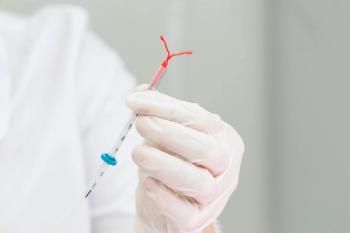
A recent study highlights the necessity of optimizing secondary prevention strategies to mitigate adverse cardiovascular outcomes in patients with HIV who face higher risks.

A recent study highlights the necessity of optimizing secondary prevention strategies to mitigate adverse cardiovascular outcomes in patients with HIV who face higher risks.

Review some of the top stories from the Contemporary OB/GYN website over the last week, and catch up on anything you may have missed.

A recent study reveals a significant association between accelerated biological aging and preterm birth, highlighting the need for further research into this potential risk factor.

Despite WHO’s goals to reduce syphilis and other STI infections by 2030, rising case numbers underscore the urgent need for intensified global disease prevention and control efforts.

Utilizing magnetic resonance imaging and ultrasound models to predict fetal weight in primigravid women can significantly reduce macrosomia-related adverse outcomes, with MRI showing superior accuracy.

A recent study reports that ring expulsions are infrequent and unrelated to body mass index or parity, with satisfaction rates remaining high among users.

New data from Kaiser Permanente suggest teenagers with autism were 31% less likely to make any ob/gyn visit, and were up to 3-fold more likely to be diagnosed with a gynecologic condition.

A recent study reveals that adolescents with autism and other developmental disabilities have fewer visits to obstetrician-gynecologists and lower hormonal contraceptive use compared to their typically developing peers, highlighting a need for improved reproductive health services.

A recent study reveals similar overall reintervention risks between a 52-mg levonorgestrel-releasing intrauterine system and radiofrequency endometrial ablation for treating heavy menstrual bleeding.

A recent study reveals no significant association between COVID-19 vaccination and the incidence of abnormal uterine bleeding among reproductive-aged women.

Review some of the top stories from Contemporary OB/GYN's coverage of ACOG 2024, and catch up on anything you may have missed.

A new study highlights significant levels of harassment in obstetrics and gynecology, emphasizing the urgent need for effective interventions.

An ACOG 2024 symposium highlighted how clinicians can work with patients at every life stage to address weight management, including the potential use of anti-obesity medications.

Mary Claire B. Manske, MD, discusses her findings on the unexplained increased risk of brachial plexus birth injury among Black and Hispanic infants, highlighting the need for improved prenatal care and further research.

A symposium at ACOG 2024 focused on how to boost clinician confidence when it comes to contraception education for this patient population.

Experts discuss the necessity of evolving prenatal care through innovative models to better meet patient needs and incorporate advances such as telemedicine.

Dive into the research presented by Rhonda R. Voskuhl at ACOG 2024, shedding light on the potential of estrogen receptor beta as a target to mitigate cognitive decline in postmenopausal women.

National survey data presented at ACOG 2024 shows many medical students applying for OB/GYN residencies prioritized states with abortion access.

At ACOG 2024, Monica M. Christmas, MD, FACOG, and Stephanie Faubion, MD, emphasize the importance of combating disinformation in menopause care and provide clinicians with evidence-based strategies to manage symptoms effectively.

Raanan Meyer, MD, shares the results and takeaways from his ACOG 2024 study on a 24-hour compared with 12-hour mifepristone-misoprostol regimen for second-trimester abortion, including the impact on patient satisfaction.

At the 2024 ACOG Annual Clinical & Scientific Meeting, experts emphasized the importance of equipping ob-gyns with the knowledge and tools to address sexual health issues, including hyperactive sexual desire disorder, anorgasmia, and pelvic pain.

Phase 3 data presented by JoAnn Pinkerton, MD, reveals that elinzanetant significantly improves hot flash frequency, sleep, and overall menopause quality of life, offering a promising alternative to estrogen therapy.

According to a poster presented at ACOG 2024, use of the synthetic opioid buprenorphine depressed fetal breathing in biophysical profile assessments, but had no significant impact on other factors like amniotic fluid index or fetal tone.

New ACOG 2024 data suggest SARS-CoV-2 in the early stages of pregnancy can lead to a higher likelihood of preeclampsia, as well as more severe disease.

A recent study presented at the 2024 ACOG Clinical and Scientific Meeting reveals that laparoscopic radiofrequency ablation significantly improves pregnancy outcomes for women with uterine leiomyomas.

Preventing congenital syphilis comes down to quick diagnosis and treatment of the infection in pregnancy, and the number of missed opportunities to do so in the United States continues to grow.

Leanne R. McCloskey, MD, and Weronika A. Armstrong, MD, xplore the multifaceted applications of misoprostol in obstetrics, covering protocols, safety, and the impact on birth equity from early pregnancy loss to labor induction at ACOG 2024.

A recent study suggests that higher CASP8 expression in embryos is associated with successful implantation outcomes in women of advanced maternal age, as presented at ACOG 2024.

Michelle Jacobson, MD, MHSc, FRCSC, shares critical perspectives on managing vasomotor symptoms in breast cancer patients at the recent ACOG Annual Clinical & Scientific Meeting, emphasizing the importance of tailored approaches amidst evolving treatment options and patient risks.

In a poster presented at ACOG 2024, investigators found that mean placental weight was higher in patients with asthma, and that pregnancy hormone levels do differ based on asthma status.